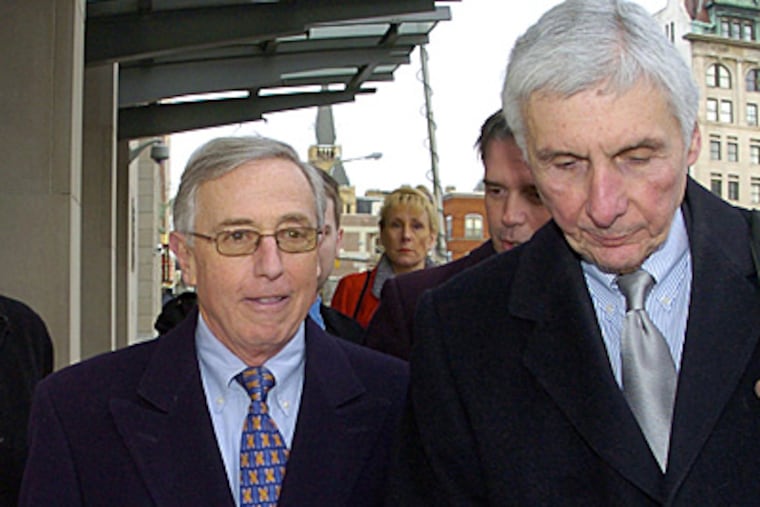Jury finds judge guilty in kids for cash case
SCRANTON - A jury Friday found former Luzerne County Judge Mark A Ciavarella Jr., at the center of the "kids for cash" scandal in Northeastern Pennsylvanania, guilty of racketeering, tax fraud and other charges.

SCRANTON - A jury Friday found former Luzerne County Judge Mark A Ciavarella Jr., at the center of the "kids for cash" scandal in Northeastern Pennsylvannia, guilty of racketeering, tax fraud and other charges.
In a split verdict, the federal jury of six men and six women found Ciavarella guilty of 12 of the 39 counts he faced.
The jurors found him guilty of racketeering in connection with a payment of almost $1 million that he and another judge received from the builder of a juvenile detention center to serve Luzerne County.
The panel also found him guilty of of hiding this money and more from the public and the IRS, by not reporting it on public disclosure forms and tax returns.
But they acquitted him of charges of extorting another $1.8 million from the builder and owner of the facility, including allegations that he shared cash stuffed into FedEx boxes.
The verdict climaxes a judicial scandal that ranks among the worst ever in the nation, especially in the area of juvenile justice.
Ciavarella, 60, now stands convicted of conspiring with another corrupt judge, Michael T. Conahan, in a scheme related to the construction of juvenile-detention centers in the region. Conahan, 58, once the top judge on the county bench, pleaded guilty in the scheme last year.
The prosecution of the judges has been a key chapter in a mushrooming federal investigation that has targeted public officials across Northeastern Pennsylvania.
In all, prosecutors have brought charges against nearly 30 officials, including a third county judge, numerous court officials, a state senator, school board members, and county officials. On Wednesday, a federal appeals court made public an opinion revealing that former State Sen. Robert Mellow (D., Lackawanna) is being investigated for "federal-program theft, extortion, fraud and money laundering."
In closing arguments Wednesday in Ciavarella's trial prosecutor Gordon A.D. Zubrod told jurors that the former judges had "turned his office into a cash-cow, into a money-making machine."
The prosecutor ripped into Ciavarella's main defense - the contention that the millions he collected came as legitimate "finder's fees," paid him for putting the facility's owner in touch with the builder.
"Mark Ciavarella is a judge and a lawyer," Zubrod told jurors. "He knows he's receiving an illegal kickback. You can't take money as a reward for doing your job."
Zubrod said Ciavarella revealed his guilt by hiding the money - "laundering" it on the way to his bank account and failing to report it on his income tax returns and public financial disclosures.
The judges' scheme began unfolding about 10 years ago at a time when Conahan was president judge in Luzerne County and Ciavarella presided over Juvenile Court there.
The pair cut off sending delinquent children to a county-owned facility, saying it was in terrible condition. This created a business opportunity for a lawyer and developer, Robert Powell, who hired builder Rob Mericle to construct a new facility.
Mericle and Powell, who went on to build a second facility, then kicked back millions to the two judges over the next few years.
Powell, the chief prosecution witness, testified that the two judges were "relentless" in their demands for money. He and Mericle have also pleaded guilty to charges in connection with the scheme and have been awaiting sentencing.
When Ciavarella took the stand in his own defense on Tuesday, he immediately admitted the lesser charges of defrauding the IRS, but insisted he had viewed the payments as legal rewards for hooking up Mericle and Powell.
"You've got to admit what you did and fight like hell for what you didn't do," Ciavarella told reporters after stepping down from the stand.
In his closing, defense lawyer Al Flora Jr. urged the jury to ignore the circuitous path taken by the money. In the case of one $610,000 payment, money was wired from Mericle to Powell, to a lawyer associate of Powell's, to Conahan's beverage company, and, finally, intto Ciavarella's bank account.
"If that money was not a kickback," Flora told jurors, how that money was transferred doesn't mean a thing because it was legal money."